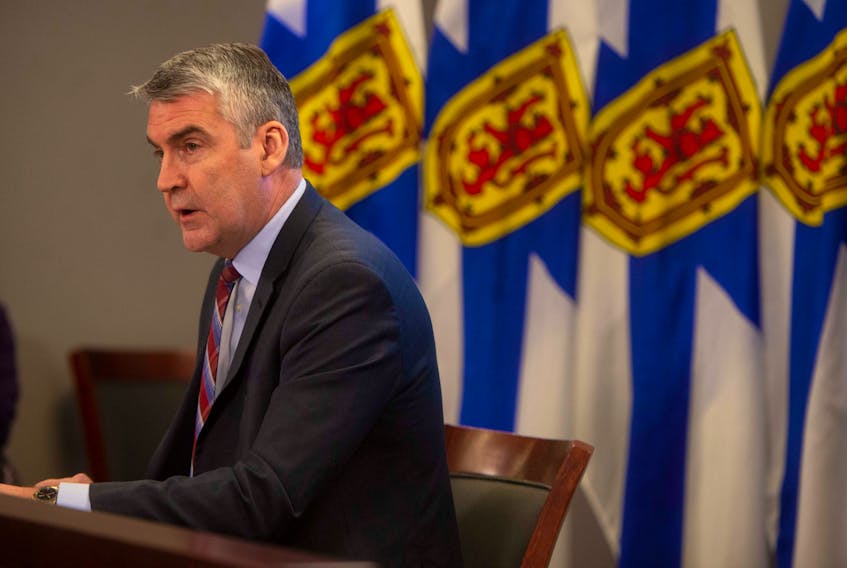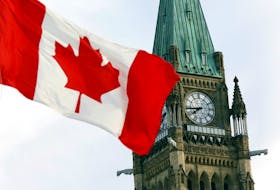The province’s refusal to share publicly how much it’s spending on COVID-19 support programs is unacceptable but illustrates a troubling shortcoming in Premier Stephen McNeil’s leadership style, says a Cape Breton political science professor.
“The premier is not comfortable with complexity or scrutiny,” said Tom Urbaniak, an expert in Canadian politics. “It is a flaw in his leadership personality.
“It is not a good political strategy in the long run. Especially during a crisis, being transparent and being forthcoming, and making ministers accessible, enhances public trust.”
The province has publicly announced hundreds of millions of dollars in COVID-19-related supports and subsidies, including a $230 million job stimulus program.
But the government will not say how much it has spent thus far on support programs for businesses and citizens coping with the effects of COVID-19.
Finance Minister Karen Casey and McNeil, who declined to be interviewed, also won’t say whether cuts are being made to government department budgets in order to pay for COVID supports and subsidies. Nor will they say whether the government is in a deficit position.
These are just a few of the basic questions that taxpayers deserve to have answered, said Urbaniak.
“An effective, transparent, professional government has to be clear on how much it is spending, for what purpose, and with what impact,” said Urbaniak. “It has to be able to open the books continuously. Municipalities and community organizations are expected to do so for their constituents and members, and rightly so.”
The premier has been increasingly bold in his attempts to stifle the role of opposition parties and the media to keep his government accountable to Nova Scotians. The premier has refused to recall vital all-party legislative committees that have been shut down since the spring sitting ended in mid-March. Those include the public accounts committee that’s tasked with monitoring government spending and the health committee, overseeing health-care access and delivery in the province.
The premier said earlier this month that those committees would remain shuttered until the fall. In the meantime, his government is operating with almost no legislative oversight.
Reporters have raised concerns about the lack of information being shared at COVID-19 media briefings attended by premier and Dr. Robert Strang, the province’s chief medical officer of health. Reporters are allowed to ask only two questions during the teleconference sessions that were once held every weekday but have been reduced to two to three times a week. Reporters have asked repeatedly in recent weeks for the premier to hold in-person briefings to allow media an opportunity to ask more questions. The premier has rejected those calls, much to Urbaniak’s disappointment.
“The premier’s press conferences are, at best, very partial transparency,” said Urbaniak. “There is no opportunity to really get into details, to understand the policy options, to understand the state of the public accounts, to examine how government is running or not running and to point out gaps and flaws.
The professor compared Nova Scotia, a small province of not even a million people, to a mid-size North American city. He said there is no way an equivalent municipal government could get away with as much secrecy as shown by the McNeil Liberals. “Can you imagine a city of a million people – the equivalent of a mid-size North American city -- where the media find it difficult to get to an elected official to ask some questions about spending or policies?
“These ministers are our neighbours. Being elusive and ducking other politicians and the media is not great in any parliamentary system, but it’s particularly unfortunate and unnecessary in Nova Scotia, where you can let your guard down a bit and have thoughtful conversations with people.”
Pointing out that the Nova Scotia government is an almost $12-billion operation, Urbaniak said at minimum the province should have enough capacity and enough professional public servants to keep a running tally of expenditures and estimated expenditures.
Gary Andrea, a spokesman for the Finance Departmnet, said in an email that COVID-19 spending would be accounted for in the Public Accounts update for 2019-20 and a forecast update for 2020-21 before the legislative deadline of Sept. 30, 2020.
“At that time we will provide the public with our projections related to revenue and expenses, including the impact of the Covid pandemic,” said the statement.
That doesn’t meet the test for adequate accountability in a true democratic system of checks and balances of government spending, said Urbaniak.
“The government should be able to at least roughly report to the public, to the Public Accounts Committee and to MLAs in real time on questions concerning finances, said Urbaniak.
Besides this, he said, the government is obligated to operate in a system of representative democracy, meaning “continual dialogue and questioning about whether spending is actually addressing the identified problems to the best extent possible.”
“That has not been happening, unfortunately, he said. “The oversight is absent. And it is not just the opposition that is being excluded. Members of the media are having trouble accessing ministers who have specific responsibilities in law. It is not even clear to me that the cabinet as a body is having sufficiently full and robust deliberations, even behind closed doors. When power and transparency are so concentrated, you are bound to make serious mistakes eventually.”
In the end the McNeil government is doing a disservice to Nova Scotians by depriving citizens of information that should be made public. At the same time the premier has concentrated the government into the hands of a tight inner circle “with no scrutiny by the House, no meetings of the main committees, no real responses to requests from the media for more detailed financial information.”
That leads to a lack of information,” said Urbaniak. “It’s going to weaken the public policy and spending decisions.”









